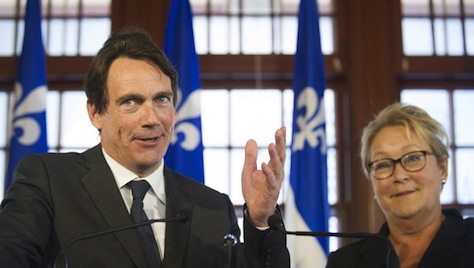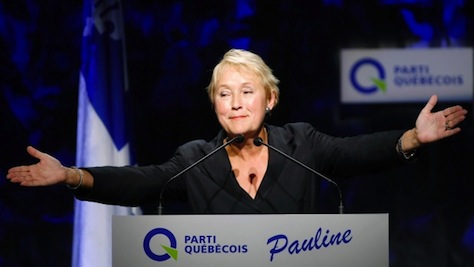When Québec premier Pauline Marois called a snap election earlier this month, the conventional wisdom was virtually certain on two points: that Marois’s sovereigntist Parti québécois (PQ) would win a majority government and that the election would turn on the Marois government’s introduction of the Charte de la laïcité (Quebec Charter of Values). ![]()
![]()
Less than two weeks later, one poll today shows that the PQ is actually trailing the more centrist, federalist Parti libéral du Québec (Liberal Party, or PLQ). The CROP/La Presse poll finds that the PLQ would win 39% of the vote, the PQ would win 36%, and François Legault’s struggling, center-right, ‘soft’ sovereigntist Coalition avenir Québec (CAQ) would win just 13%. Québec solidaire, the more leftist, sovereigntist alternative, wins 10%. The PQ still leads among Francophones by a margin of 43% to 30%, though the Liberals win 71% of Anglophones. Far from winning a majority government, Marois could actually lose her minority government if the Liberals keep gaining strength.
What’s more, the emergence of former Quebecor CEO Pierre Karl Péladeau (pictured above, left, with Marois) as a PQ candidate fundamentally transformed the election’s focus away from the cultural issues surrounding the religious freedom debate and the Charter of Values — and toward the issue of Québécois independence. Right now, that’s working to the benefit of Liberals, because a majority of Québec voters today oppose independence.
* * * * *
RELATED: Marois calls snap election with eye on Québécois separatist majority
* * * * *
Péladeau, when he announced his candidacy last Sunday for the PQ, surprised everyone by declaring his strong support for Québec’s independence. That took the focus off Marois’s Charter of Values and put it squarely on whether Marois will call a referendum if the PQ wins a majority government on April 7. Marois herself spent last week musing about an independent Québec, including post-succession monetary policy and retaining the Canadian dollar.
That made it look as if Péladeau is more in control of the PQ campaign than Marois, thereby undermining Québec’s sitting premier. This week, with the PQ’s poll numbers declining, Marois is now trying to avoid talking about the sovereignty issue and limit the damage from her star candidate’s outspoken entry into provincial politics.
The idea was that Péladeau, as a well-known businessman, would give the PQ more credibility on economic policy, thereby peeling away some of the more economically conservative voters that previously supported Legault and the CAQ in the last election — and maybe even some Liberals.
Instead, all the talk about sovereignty and independence has given Liberal Party leader Philippe Coulliard an opportunity to frame himself as the candidate talking about ‘real issues,’ including his plans to cut taxes while also cutting spending in order to balance the province’s budget. Polling data from the past week suggests that former CAQ voters are moving to the Liberals instead of to the PQ. What’s more, the conservatism of Péladeau as the PQ’s top candidate seems to be pushing some PQ voters toward supporting Québec solidaire instead. Continue reading Péladeau candidacy transforms Québec provincial elections


